-
NOCTURAMA (Bertrand Bonello 2016)
BERTRAND BONELLO: NOCTURAMA (2016)
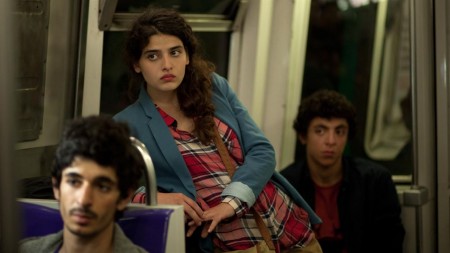
HAMZA MEZYANI, MANAL ISSA IN NOCTURAMA
Bonello's ballet of young terrorists
Ideally the title will seem to you dark, cool, and threatening. Those who've been unable to avoid seeing the trailer, as I have several times, will suspect a terrorist act involving a dozen or so young people of mixed social and racial types. But it's still a gripping, tense thriller composed in new ways: staccato, process-oriented, powerfully suspenseful, turning a cold eye on youth, politics, consumerism, holding you in its tight, sweaty grip for over two hours. Dazzling in another genre, Bertrand Bonello goes on showing his originality, boldness, and chops.
Even the unsatisfied ones must grant the boldness and variety of Bonello's filmography, in what I've seen of it. Apollonide was a languorous period film of a nineteenth-century Parisian bordello. Saint Laurent (NYFF 2014) was a biopic, but a cool one, focused on the designer's period of high fame and other highs, and lows, drugs, decadence and depression- with a to-die-for cast including Gaspard Ulliel, Helmut Berger, Dominique Sanda, Léa Seydoux, Louis Garrel, Jérémie Renier, Valeria Bruni Tedeschi - YSL himself would have liked to be in it. Nocturama takes on the different challenge of an action film. Except Adèle Haenel, who speaks a key line, and Vincent Rottiers and Finnegan Oldfield (not really box office luminaries) the cast is carefully selected but largely unknown.
The anonymity and youth of this team underlines its simple efficiency. It works perfectly to do what it's set out to do. As the young people rush around taking Métro trains hither and yon in the disquieting, brilliantly conceived opening sequences, grabbing stuff, and tossing "burner" phones, all focus and all energy go into the operation. What is it? We don't know till it happens. And Bonello plays a bit with time, shifting back and forth among the characters, challenging and confounding us (this is a movie that will benefit from repeated viewings). When it's over, as we know from movies from Rififi to Reservoir Dogs, then things tend to go wrong. But the question is how. Each one must transcend the tradition in his own way. What's new about Nocturama is the strange, subtle, drawn-out disintegration, staged in a large, old, extremely posh Paris department store where the young terrorists mysteriously assemble, and hide, and wait all night.
Bonello has explained how he conceived this movie while working on the "opiate," sleepy Apollonide: something completely different, contemporary, fast, hard, energetic, explosive. (It's explosive, alright.) The opening rushing around of the young men and women he saw as like a ballet, organized, purposeful. Then, the shock, the explosions. Last, the waiting, dissipation of energy, chaos. As he describes it, his film was thus conceived in contrasting movements, abstractly, impressionistically, telling its story "plus dans l’action que dans le discours (more in action than in speech). So, nothing likeRififi's long period of planning. No filling in of character - except for one or two, and what emerges or is hinted at in the last third. Viewers may complain of a lack of character or of technical detail. They can't fuss about the tension. That screws up tight in the first frames and won't let go even in the enveloping flames of the final credits.
Bonello is musical and particularly here tecnno and other types of very loud contemporary music are screwed up to a pitch to produce a sense of (I have to keep using this word) tension, dissolution, Dionysian release: in the deluxe playpen that is this department store where the wind up the kids find the sound system department and crank up the Bang & Olafson. It throbs and screams and shakes us. When after the Paris attacks of 13 November "Paris est une fête" (Hemingway's celebratory Moveable Feast) having become too much a morale-building rallying cry, no longer was a good title, Bonello browsed through his albums and found "Nocturama" by Nick Cave, a word that turns out to apply generally to the part of the zoo for nocturnal animals which fits the film and its conclusion too. Terrorism became specially sensitive for French people in 2015, but Bonello avoided problems by staying focused on the subject as he conceived it six years ago.
Mike D'Angelo rated this highest (74) of the films he first saw at Toronto (Toni Erdmann was an 82, but already seen at Cannes). His tweet was hedging on the score, "Depends where I ultimately land on the ending, the ugliness of which I'm not sure is justified. But this is stunning." So: yes, the ending, where the Gendarmerie Nationale's shock team GIGN moves in and guns them down, is brutal and numbing. But it provides the decisive sense of an ending that suits the construction of this remarkable film. This is a conceptual revolutionary movie on steroids. Especially at the end it didn't really remind me of the November 2015 Paris attacks but the claustrophobia of Marco Bellocchio's 2003 Buongiorno, notte (2003) about the Red Brigade kidnapping of Aldo Moro - which does not end well. After D'Angelo's recommendation, I was surprised Nocturama wasn't in the New York Film Festival (so was he). Now that it belongs in the US to Netflix, people are afraid it won't see the big screen, or not much. That would be wrong. It's a magnificent looking and sounding film - even if in its effective creation of discomfort and nerves it goes on a bit too long at two hours and ten minutes.
Nocturama, 130 mins., premiered in Paris 8 July 2016, in French theaters 31 August. Over 15 international festivals starting with Toronto. AlloCiné press rating is 3.4; Metacritic rating 73. (On D'Angelo's scale, his 74 is much higher.) Some French critics were displeased by the lack of context or politics or realism, want these young people to be vicious ideologues instead of confused and naive, as they are. Les Inrockuptibles gets it right: the film shows their utter foolishness but is tenderly sympathetic toward their anger and frustration with the materialistic world they've inherited. Screened for this review as part of the Film Society of Lincoln Center-UniFrance 1-12 March 2017 Rendez-Vous with French Cinema.
Last edited by Chris Knipp; 04-25-2017 at 07:23 PM.
-
RÉPARER LES VIVANTS/HEAL THE LIVING (Katell Quillévéré 2016)
KATELL QUILLÉVÉRRÉ: RÉPARER LES VIVANTS/HEAL THE LIVING (2016)
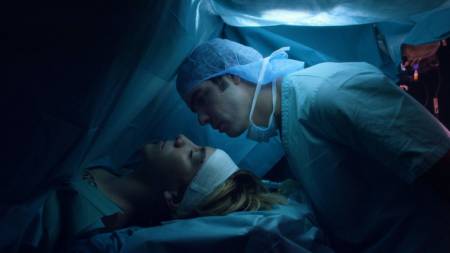
GABIN VERDET AND TAHAR RAHIM IN RÉPARER LES VIVANTS
It all comes together
Katell Quillévéré's third feature adapts Maylis de Kerangal’s bestselling French novel (Heal the Living), a humanistic medical thriller about events leading up to a heart transplant. It begins with Simon (Gabin Verdet), the bleach-blond surfer boy whose car accident makes him brain dead and his perfect organs available for replacing others' failing ones, if his devastated parents, Marianne and Vincent (Emmanuelle Seigner and Kool Shen) are willing. Meanwhile there are closeups of the medical professionals involved, young cardiologist Thomas Rémige (Tahar Rahim) and his master Docteur Pierre Révol (Bouli Lanners) and nurse Jeanne (Monia Chokri). Then we observe Claire (Anne Dorval of Xavier Dolan's Mommy), the lady who is to receive Simon's heart, a lesbian classical pianist and motehr of two college-age sons (Finnegan Oldfield, Théo Cholbi) whose heart's days are numbered.
Like Tell No One, a French version of an American crime story way better than Hollywood could do it, this is a ridiculously vivid, clear, humanistic and tasteful version of what seems the most conventional US TV medical drama material, and you cannot but admire it, while in the back of your mind still wondering, why did she bother? Quillévéré's leap forward as a director of complex, demanding movie dramas - with more budget and more name cast members - is also a step back out of the raw indie territory she inhabited in her first two movies into a safer, more mainstream, even if demanding, work.
But it's still an ambitious, complex film, and not only does she never slip into the saccharine territory that the material threatens to draw her into, but she provides some lovely touches, while the whole fits together impeccably.. The opening passage when Simon leaves his girlfriend Juliette (Galatea Bellugi) in the wee hours, leaping out the window, races a pal, suits up and surfs - water sequence magnificently shot to show both perfect marriage with the waves and threat of death. Then the fatal drive, turned into a sea death as sleepiness of all three youths makes the road and horizon fade into soft waves, the crash just a bang, no messiness. This whole Simon passage, a model of its kind, is of a sublime simplicity and physicality, delivering nothing but a sense of youth, health, and impermanence. The only further development of Simon is equally physical: to seduce Juliette at first meeting, he successfully races her rail car with his bike, leaps over his bike in a move I've never seen, climbs up breathless to the platform, and they kiss.
Later, the film gets equally intimate in a lower key in following Claire as she interacts with her concerned sons Maxime (Oldfield) and Sam (Cholbi) and attends a piano concert by her beautiful protégée and former lover Anne Guérande (actress and pianist Alice Taglioni). She also meets with her cardiologist, who will perform the translpant; Drs. Rémige and Rémol will remove Simon's heart. Claire's scenes require a refocusing effort from the audince after the intensity of the earlier passages, all of them at a high pitch further heightened by Alexandre Desplat's piano-based score. The presence of the well-known French movie composer is a sign of the glossier production, but Thomas Marchand, the editor, whose presence is more essential, was present on the director's first two films. Claire's sequences apparently add to a barely outlined character in the novel, and they're still relatively flat after the vivacity and invention of Simon's sequences and the high pitched emotions of his parents' grieving. A turning point in the film, and a key to its humanism, comes when Marianne and Vincent, still in great grief, come to accept the goodness of allowing their son to be an organ donor.
The still boyish Rahim, who gently elicits this decision, is a good choice for exuding human kindness, and the film's best moment and best evocation of the magic of the medical miracle this story is about comes when he carries out a ritual farewell to Simon in the operating room following the boy's parent's directives, and it's at this moment that this tasteful and economical film indulges in its one repeat sequence, Juliette's tearful face in the light of dawn and Simon's leap out her window: rhythmical repetition, a joining of the circle, death and life.
Still, for all this beauty, though may not miss the oddness of the director's debut Love Like Poison, one does miss a bit the wildness and emotional extremity of her sophomore effort, Suzanne, which also put Adèle Hanel on the map. What Réparer les vivants, heavily publicized in France and widely distributed there, does do, is show that Quillévéré is a directorial talent both recognized and worth continuing to follow.
Réparer les vivants/Heal the Living, 105 mins., debuted at Venice Sept. 2016, also showing at Toronto and London. French theatrical release bega 1 Nov. 2016. Origially screened for this review at UGC Danton, Paris, 1 Nov. 2016. Also screened as part of the Film Society of Lincoln Center-UniFrance series Rendez-Vous with French Cinema (1-12 Mar. 2017).
-
MAL DE PIERRES/FROM THE LAND OF THE MOON (Nicole Garcia 2016)
NICOLE GARCIA: MAL DE PIERRES/FROM THE LAND OF THE MOON (2016)
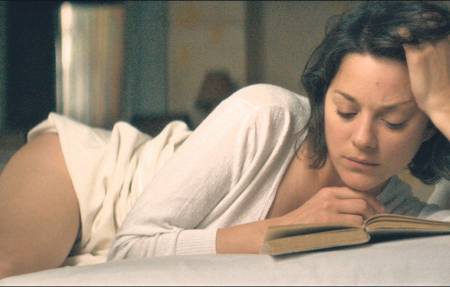
MARION COTILLARD IN MAL DE PIERRES
Magic Mountains
"Gabrielle (Marion Cotillard) comes from a small village in the South of France, at a time when her dream of true love is considered scandalous, and even a sign of insanity. Her parents marry her to José (Alex Brendemühl), an honest and loving Spanish farm worker who they think will make a respectable woman of her. Despite José's devotion to her, Gabrielle vows that she will never love José and lives like a prisoner bound by the constraints of conventional post-World War II society until the day she is sent away to a cure in the Alps to heal her kidney stones. There she meets André Sauvage (Louis Garrel), a dashing injured veteran of the Indochinese War, who rekindles the passion buried inside her. She promises they will run away together, and André seems to share her desire. Will anyone dare rob her of her right to follow her dreams?"
That's an IMDb plot summary for this new film by Nicole Garcia, which opened in France today, 12 Oct. 2016. It's nice to see Marion Cotillard looking beautiful and being full-on passionate again after her unflattering role in Xavier Dolan's tiresome It's Only the End of the World. It's also enjoyable the way Nicole Garcia likes to take us for a wild ride, as she did in her pleasingly mysterious - and more contained and interesting - 2013 Un beau dimanche/Going Away. And this is terribly romantic. Having Marion Cotillard and Louis Garrel fall in love in a Swiss sanatorium provides an exotic new dose of French movie glamor.
Adapted by the bestselling Strega-prize wining novella by the Sardinian writer Milena Agus, this is like Nicolas Sparks in French, on acid. It transfers events from Italy to France, and considerably simplifies the plot. Set in the post-war period, it focuses on an eccentric, strong-willed and sensuous woman who's put in an arranged marriage with a Spanish man when she's over thirty. Both swear they will never love each other. The husband is allowed to see prostitutes but his wife Gabrielle starts taking the prostitute's role to save them money. They try to have a child but her painful kidney stones cause repeated miscarriages. Her husband sends her to the cure in the mountains so she can have a baby, and she does. You think you know exactly where things are going, because there is a frame tale, and a very long flashback, so we know what's up with Gabrielle in the present, so when we see her finally meet Louis Garrel's dreamily ill French army officer back from Vietnam at the mountain water cure resort, and he plays Tchaikovsky's "Barcarole" so beautifully on the piano, we think we know what's going to happen.
The plot pitches us a couple of curves that feel unconvincing. The movie explanation is less convincing than the novella's, and and also winds up confusing the ongoing issue of whether Gabrielle is crazy or not. Once we get to the mountains, there are some very nice scenes and the watered-down "Magic Mountain" sequences are engaging. Cotillard and Garrel and even the underappreciated Brendemühl get to do some nice work - that doesn't, however, quite work.
A lot of the early stuff is unnecessary. It should not take so long to show Gabrielle is unhappily married, and is looking for a great love. In all the establishing scenes one feels one is being force-fed; in the mountain "cure" ones, that one is being offered a cartload of sweet pastries. Screen International calls this "an old-fashioned romantic weepie," but it pitches too many curves to provide that kind of simple satisfaction.
at Cannes May 2016, four other festivals; French theatrical release 19 Oct. 2016. Again a film well received by French critics (AlloCine press rating 3.6) that English critics have little use for (Metacritic score 42%). Screened for this review at UGC Odéon Paris on 19 Oct. 2016. Also screened as part of the Rendez-Vous with French Cinema (FSLLC/UNIFRANCE 1-12 MAR. 2017).
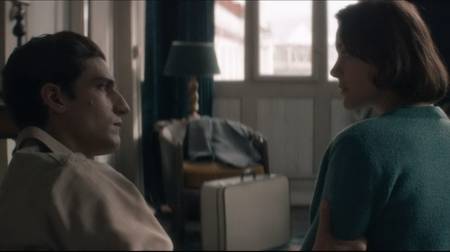
LOUIS GARREL AND MARION COTILLARD IN MAL DE PIERRES
-
DANSEUSE, LA/THE DANCER (Stéphanie Di Giusto 2016)
STÉPHANIE DI GIUSTO: LA DANSEUSE/THE DANCER (2016)
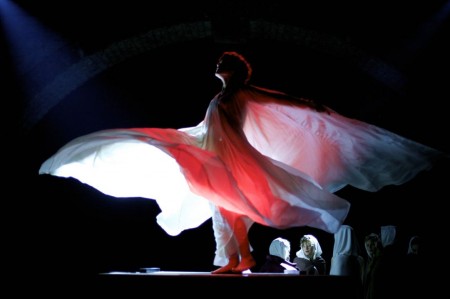
SOKO IN THE DANCER
Biopic of a turn-of-the-century dance innovator is showy, but fails to engage
Stéphanie Di Giusto's directorial debut is a lush but routine biopic. Its subject is a turn-of-the-century American dancer and theatrical staging pioneer known as Loïe Fuller, who took her talents to Paris. She wowed theatergoers with her dramatically swirled drapery and advanced use of mirrors and colored light. After a struggle for acceptance of her unusual routine, her talents were showcased at the Folies Bergère and briefly the Paris Opera. She helped other performers including the now more famous Isadora Duncan.
La danseuse begins with a long, unnecessary introduction depicting the protagonist's early life in America. This passage shows her past to have been exotic in French terms, with its trappings of a Western, her drunken father and bossy mother and her habit of carrying around a pistol. But none of this seems relevant later except to learn she was a child actress before conceiving more elaborate and unconventional performances and stagings.
As Fuller, we get the 100% commitment of Soko, who played the hypnosis subject of Alice Wincour's moody, stylized Augustine, with Vincent Lindon. Names in the cast include Gaspard Ulliel as the decadent Conte d'Orsay (an invented character, with him playing a less interesting version of his Saint Laurent lead),Mélanie Thierry as the dancer's beautiful manager, collaborator and lover Gabrielle Bloch; François Damiens as director of the Folies Bergère, Louis-Do de Lencquesaing as the Paris Opera boss, Christopher Plummer's daughter Amanda as Fuller's temperance crusader mother, and Johnny Depp and Vanessa Paridis's daughter Lily-Rose Depp as Isadora Duncan. The Conte d'Orsay is Fuller's involuntary Maecenas and would-be lover, who's hooked on ether, a period drug in this very period movie. Fuller flourished in the Nineties and early twentieth century. Perhaps the greatest success of this ho-hum effort is the way it evokes the tastes of its times - for such things as this cloth-swirling show, and for young women in diaphanous, vaguely classical drapery running around in the woods.
Di Giusto's film, written in collaboration with Jacques Audiard's writer Thomas Bidegain, takes various liberties, jazzing up lesbian relationships, adding a fictitious character in the Count, and dwelling so much on Loïe's muscle pains and eye trouble she comes to seem as much a patient as a performer. Swirling the gauzy materials around is shown to be a huge physical effort, sometimes leading to exhaustion. It hurts! What's wrong with her eyes - severely damaged apparently by the bright lights? We never really learn, but she spends the last third of the labored film putting in eye drops and wearing round sunglasses. Isabella Duncan, with Lily-Rose Depp lacking the authority to play such a future diva, is presented ambiguously. At some moments it seems we're supposed to hate her for seeming about to steal Loïe Fuller's fire. At others they seem not only friendly collaborators but erstwhile lesbian lovers. Loïe's off-and-on affair with the Conte d'Orsay has been strenuously criticized in queer circles for falsifying by diluting her pioneering open homosexuality.
Loïe's personality is otherwise unclear, seen as a mix of fiercely ambitious, physically determined, and insecure. She keeps saying she is not a dancer. And indeed her "flame" performance, in once scene impressively recreated here, is more playing with cloth and lightening than dancing in the classical sense. With all the effort, suffering, mood swings, and physical problems, Loïe Fuller still doesn't quite emerge as a real person. Even the final sequence, a fraught long-awaited debut at the Paris Opera, is ambiguous. It seems Loïe is barely able to go on, and as staged her performance, all in white instead of with the colors, seems lackluster, a disaster ending in collapse. Then she goes out to receive a standing ovation. Maybe that's how it actually was. But despite the impressive mise-en-scène, cast dotted with notables, and collaboration in the writing from Thomas Bideguin, Di Giusto has not produced a coherent or solidly enjoyable film.
The Dancer/La danseuse, 109 mins., debuted at Cannes may 2016; over a dozen other festivals, including the Rendez-Vous with French Cinema of FSLC and UniFrance (1-12 Mar. 2017), as part of which it was screened for this review. The French theatrical release 28 Sept. 2016 led to mixed reviews (AlloCiné press rating a fair 3.4). Most critics admired the dedicated performance of Soko; some noted the biopic conventionality.
Last edited by Chris Knipp; 02-17-2017 at 04:54 PM.
-
IN BED WITH VICTORIA/VICTORIA (Justine Triet 2016)
JUSTINE TRIET: VICTORIA/IN BED WITH VICTORIA (2016)
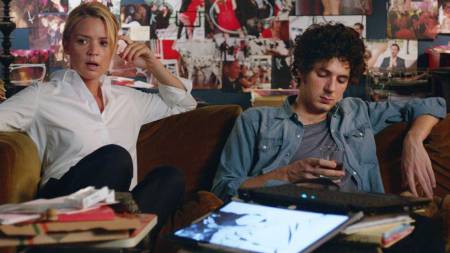
VIRGINIE EFIRA AND VINCENT LACOSTE IN VICTORIA
A hectic blonde lawyer
Victoria, with the delicious and amusing Virginie Efira in the lead role and featuring Vincent Lacoste and Melvil Poupaud, is a distinctive modern French version of a Hollywood screwball comedy, and the second film of Justine Triet, whose debut was the tour-de-force The Age of Panic/La bataille de Solferino (Rendez-Vous 2014). Its lead character is Victoria Spick, a divorcee with two young daughters whose career as a trial lawyer is highly accomplished but whose personal life is a trainwreck. And this has been compared to the recent Judd Apatow/Amy Schumer vehicle of that name. While Efira's talents may not match Schumer's, she's got them; and she and the other leads contribute to the fun by freely improvising. The jazzed-up English "in bed" title misleads a bit. Victoria keeps arranging online hookups for herself at her apartment, but she never manages to be in the mood.
The movie is perhaps most hilarious at the outset, during a chaotic, also American style, wedding party, but the trial that's the action's main focus has its moments too, even when a Dalmatian and a chimp are introduced in the elegant red courtroom as witnesses. Vincent Lacoste (if memories of him in Julie Delpy's crude Lolo don't kill him for you) plays a charmingly silly yet sincere and helpful young man ripe to become this lighthearted film's love interest. Victoria got Sam Mallet (Lacoste) off a drug dealing charge; they meet up again at the wedding. Out of work (without the drugs) and in effect homeless, he wants to be her law trainee and, to solve his residential problem, act as her au pair babysitter. Later he wants to be her lover, and this affectionate and more sincere hookup may solve her midlife sex crisis.
Vincent (the ever-watchable Melvil Poupaud), a dear friend of Victoria's, does a song and dance number at the wedding, a wonderful quick mix of modesty, ease and charm. Good and drunk, he tries to have sex at the party with his nutty ex, with her pet Dalmatian watching disapprovingly. (We don't see this.) She then accuses him of stabbing her in the stomach. (He says she stabbed herself: we don't see this.) He is arrested, and he insists Victoria defend him (we see this). She protests that mixing the personal with her criminal defenses is a big mistake, but gives in. Scenes at her sublimely chaotic apartment (thanks to production designer Olivier Meidinger) show the amiable disorder of her home life. (The two girls are charmingly and sparingly used.) When her ex, David (Laurent Poitrenaux), turns up uninvited, he reveals that he's writing a blog now that's a big hit due to its thinly disguised details of her professional and personal peccadilloes, including sex with judges (back in the day when she was up for sex, evidently). This leads to another court case, since his revelations threaten her career. A narcissistic nincompoop, he conducts his own defense.
Vicky's periodic arranged assignations at home only lead to confusion or nerves. Once an abandoned session gives her a serious anxiety attack and Sam, experienced at helping clients through bad trips, coaches her back to calm. He administers a Xanax, and she dozes. Her sleeping beauty is what enamors Sam and makes him want to kiss her. Meanwhile she sees not only a (white male) "psy," a shrink, but a large black female psychic who card-reads her fortune, usually disapprovingly. This mélange, when shown in rapid succession, produces a quietly giddy state of amusement in the sympathetic viewer - who, however, may be surprised when Vicky is summoned before the bar council for talking to a witness in a case. It was a woman who came to her home and harassed her: she should have refused to speak. Despite a beautiful lawyer's pleading in her defense, she gets suspended, like Will Gardner (Josh Charles) in "The Good Wife," but for a lesser offense and only for six months.
This leads her to let Sam go, but the girls will miss him and he will be in the wings ready to return when her suspension ends - and Vincent begs her to take his case again now that an old girlfriend (Claire Burger) has appeared, inspired by word of his impending trial, to accuse him of harassment. She will take the case on, with little time to prepare, and Sam will be back to become her lover and law assistant as well as man slave. The trial will climax with its Dalmatian-chimp appearances and a favorable outcome for Vincent and Vicky. But despite all the action this movie, which is glossier but obviously less original than La bataille de Solferino, isn't so much notable for its plot drive as for its comic vignettes, like Victoria's failed at-home sex hookups, Poupaud's song and dance performance, the meetings with Sam, the shrink and card-reader sessions. Triet manages to be both over-the-top and tastefully French - and sexy, especially in one heavy makeout scene between Lacoste and Efira (who throughout play very well together). It is this mixture that, especially if you're a fan of French film comedy, that will endear Victoria to you.
Victoria/In Bed with Victoria, 90 mins., debuted at Cannes May 2016 and opened in French cinemas 14 Sept. to great reviews (AlloCiné press 4.0) including a rare rave from Les Inrockuptibles and a favorable opinion from Cahiers du Cinéma. French critics more than once mentioned Woody Allen, and so does the American Jordan Mintzer of Hollywood Reporter, who locates Triet's comedy "somewhere between more femme-centric Woody Allen films like Alice or Another Woman and the work of French farce maven Louis de Funes." Shown at a dozen or so other festivals including Chicago and Vienna. Screened for this review as part of the 1-12 Mar. 2017 UniFrance-Film Society of Lincoln Center series The Rendez-Vous with French Cinema.
Saturday, March 4, 9:30pm (Q&A with Justine Triet)
Sunday, March 12, 3:30pm
Last edited by Chris Knipp; 12-05-2018 at 07:23 PM.
-
MA LOUTE/SLACK BAY (Bruno Dumont 2016)
BRUNO DUMONT: MA LOUTE/SLACK BAY (2016)
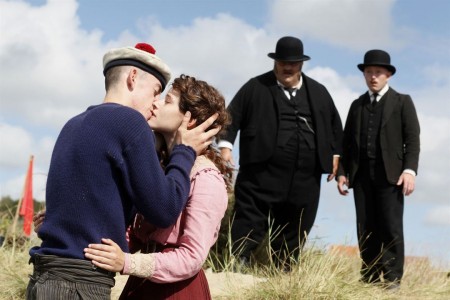
BRANDON LAVIEVILLE, RAPH, DIDIER DESPRES, CYRIL RIGAUX
A post-Victorian slapstick murder mystery by the sea takes Bruno Dumont in a new even stranger direction
In Ma Loute/Slack Bay, one of the weirdest and most arresting movies you may ever see, the Bruforts are a family of rude sailors who carry softer folks across a shallow bay in their arms. They also practice cannibalism, and that explains the disappearance of a young couple from Lille. This event is being vaguely investigated by inspectors Machin and Malfoy (Didier Després, Chril Rigaud), a Laurel and Hardy-like pair. The Bruforts' eldest son, an angular rube called Ma Loute (Brandon Lavieville), connects with the daughter - or is it the son? - Billie (Raph) of the haughty Van Peteghem family, who have come to their Egyptian-style manse on the hill for the summer. This might be a love that would cross the class divide, and the sexual one too, since "ma loute" is a feminine term of endearment - but instead it goes bad. The action is set in the early days of automobiles, in 1910, by the sea, near Dumont's usual rather desolate home region of Bailleul, Nord, but we're far from the harsh, intense neorealism of his early films if not from their religious overtones.
An extension in a way of his 2014 mini-series P'tit Quinquin/L'il Quinquin, which also has a pair of bumpkin cops investigating a chain of murders, this is stranger and harder to relate to. It's a costume drama, with elaborate, melodramatic, absurd acting mannerisms. It also has two more name actors. Valeria Bruni Tedeschi and Fabrice Lucchini join Juliette Binoche, who was there last time. All behave and look peculiar. In the case of Binoche, as Aude Van Peteghem, this is allowed to go much too far: she croons and moans - it's just bad overacting. Lucchini, as André Van Peteghem, comes off better. He is almost unrecognizable, his face looking flat and a little bloated; almost a hunchback, he lurches back and forth, his arms flailing oddly. Brother Christian (Jean-Luc Vincent, Paul Claudel in Dumont's 2013 Camille Claudel) is similar. Everyone tends to fall down a lot. So does the big, bloated Inspector Machin, who rolls down sand dunes and topples into things constantly. Does all this ineptness, these pratfalls, make this a comedy? But what about the cannibalism?
Dumont is always unclassifiable. Hence it should not surprise us that he was meaning here to evoke the haute-bourgeoisie charm of the photographs of Jacques Henri Lartigue (at least in his detailed article on the making of the film in Le Monde, Jacques Mandelbaum says so). Or that there is an interrupted outdoor ceremony in celebration of the Virgin Mary that leads Aude to float up into the air, which happens to Machin in the final sequence, when he inflates even more, and breaks away from a rope. Magic realism, surrealism, horror, harsh social satire, slapstick, black Charles Addams comedy form a mixture that is both numbing and hypnotic.
This personal world is rich and fascinating in its way. And it's beautiful: look at the delicate color, and the lovely decor of the Van Peteghem dining room. Watch the romantic, painterly scene of small boats on a stormy sea and listen to the soaring music of Bach at the end. And yet the action lacks the charm of L'il Quinquin or the power of Dumont's strong earlier films. Here, he has lined up two class enemies, a "decadent bourgeoisie and carnivorous proletariat," as Philippe Lagouche of La Voix du Nord put it, in a "ferocious farce" that "Buñuel would have loved."
With the exception of the misfired US-set Twentynine Palms, Dumont made one stunner after another: Life of Jesus, Hunanité, Hadewijch (NYFF 2009) and Hors Satan command one's utmost attention, almost reverence, even if one is at times also repulsed. Well, Slack Bay/Ma Loute too provides a bracing, unique experience. But Dumont seems to have entered a mannerist phase.
Ma Loute/Slack Bay,122 mins., debuted at Cannes in Competition May 2016 and opened in French cinemas simultaneously, to rave reviews (AlloCiné press raging 4.1)
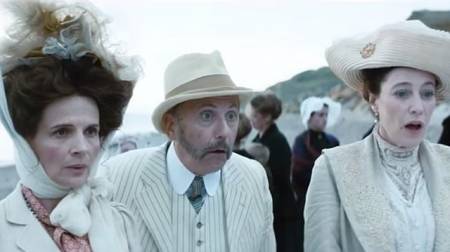
BINOCHE, LUCCHINI, BRUNO TEDESCHI
Ma loute/Slack Bay, 122 mins., debuted at Cannes in Competition May 2016 and opened in French cinemas simultaneously, to rave reviews (AlloCiné press raging 4.1). Screened for this review in Rendez-Vous with French Cinema (UniFrance, Film Society of Lincoln Center) Feb. 2017. US theatrical release begins 21 Apr. 2017. A Kino Lorber release.
Last edited by Chris Knipp; 06-18-2017 at 02:02 PM.
-
L'ODYSSÉE/THE ODYSSEY (Jérôme Salle 2016)
JÉRÔME SALLE: L'ODYSSÉE/THE ODYSSEY (2016)
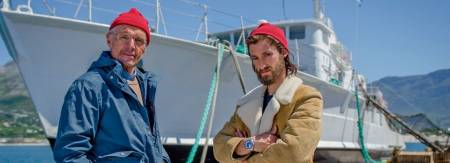
LAMBERT WILSON AND PIERRE NINEY IN L'ODYSSÉE
Shallow waters
This biopic follows the career of the famous French undersea explorer and maker of TV documentaries Jacques-Yves Cousteau. He was a pioneer who made the world of water his domain. Commander Cousteau (Lambert Wilson), depicted here with his two sons Jean-Michel (Benjamin Lavernhe) and Philippe (Pierre Niney) and his wife Simone (Audrey Tautou), was a naval officer, member of the Académie Française, scientist, innovator (most notably of the aqualung), explorer, conservationist and indefatigable public figure as well known in America and beyond as in his native France. Salle has made a grand and glorious film full of energy and hope and enlivened by big, bright, open images of sun and sea, with some breathtaking underwater photography. The cinematography by Matias Boucard is luminous, the music by Alexandre Desplat sweeping.
And yet this movie based on books by Jean-Michel and Albert Falco takes on a routine air early on and winds up being at times on the flat and disappointing side, too timid in its exploration of rough truths, too hagiographic all the rest of the time. Salle's handsome, beautifully filmed movie has a few impressive diving sequences, but not many and only a couple that are awesome. But maybe that wasn't the point. Public issues and personal problems are not ignored. The trouble is that throughout, the film seems showy and artificial. It winds up feeling like a missed opportunity: too often the ceremonial overtakes the dramatic, and overall a bit on the bland side. Salle's Odyssey is a spectacle that will delight fans of ocean photography and of Cousteau. It's just not one of the year's compelling dramatic films.
The film doesn't hesitate to depict some of Cousteau's sad, dark times and conflicts with Simone and Philippe. Tautou and Niney shine, and this is further proof that Niney has the makings of a big star, who's perhaps at his most dashing and sexy on screen yet as Philippe. Philippe's conflict with his father began when the brothers were sent off to boarding school, which he considered "abandonment." It's clear the Commander has some large blind spots and a giant ego, and loves fame as much as he loves nature. Niney provides glamor and excitement as well as eye candy (the glowing skin, the sculptured torso, the glossy locks, the steamy glances), but the clash of father and son is powerful dramatic material that the film unfortunately only touches on.
There are important historical themes here. First of all Cousteau begins diving at a time when it was all new. He and his collaborators (a crew lovingly satirized in Wes Anderson's endearing The Life Aquatic with Steve Zissou <), with the big boat The Calypso, had to develop the aqualung, to breathe underwater, and the pressure-resistant cameras they used to photography the marvels they found. And then Cousteau had to develop a career - the big American contract to make films to be shown on TV. Over the decades, we see how this innovator started to become outmoded.
The height of Cousteau's fame comes through the Palme d'Or-awarded film (based on his first book), The Silent World, co-directed with Louis Malle; and then, starting in the Sixties, for decades the "Voyages of the Calypso" TV series was standard fare in the US and elsewhere.
The film gradually reveals the extreme naivety of the Calypso crew, who ignored how they were destroying the world they were observing. Cousteau is aware of ecological issues early on, but does work for petroleum interests because he needs financing - and that's an issue from the start, when Simone sells all her jewels to buy the Calypso. Later, the Commander forgets about ecology and cheats on his wife. This behavior causes a serious rift with Philippe, who disappears for four years - and Niney is missed. But they make up.
Fabien Lemercier comments on Cineuropa.org</a> that [i]L'Odyssée "doesn’t dig too deeply, so as to preserve the audiences’ empathy for its characters." That's precisely the trouble with this beautiful, ambitious, not unrealistic but still thoroughly timid movie. Commander Cousteau dives under the waters, director Salle stays on the surface.
L'Odyssée/The Odyssey, 122 mins., debuted 23 Aug. 2016 at the Festival du Film Francophone d'Angoulême, also showing at four other festivals, and released in French Cinemas 12 Oct. by Wild Bunch. French critical response was positive but not exceptional (AlloCiné press rating 3.4). Les Inrocks, Le Figaro, Libération, Le Nouvel Observateur, and Le Monde] all published reviews expressing serious disappointment. See the lively take-down in Le Nouvel Observateur and the explication of the more complex issues in LIbération. This film was originally screened in Paris in Oct. 2016, and again for the March 2017 FSLC/UniFrance Rendez-Vous with French Cinema, in New York.
 Posting Permissions
Posting Permissions
- You may not post new threads
- You may not post replies
- You may not post attachments
- You may not edit your posts
-
Forum Rules





 Reply With Quote
Reply With Quote








Bookmarks